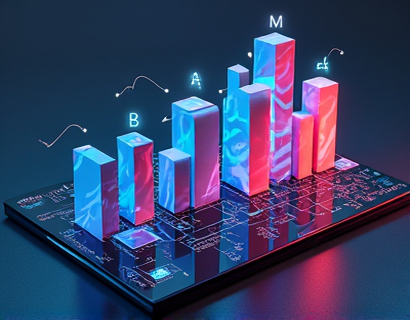The Convergence of Crypto and AI: Revolutionizing Digital Engagement
The digital ecosystem is undergoing a profound transformation, driven by the synergistic power of cryptocurrency and artificial intelligence. This convergence is not just a technological advancement but a paradigm shift in how we interact, engage, and experience the digital world. As tech-savvy individuals and professionals delve deeper into the realms of crypto and AI, it becomes increasingly clear that these technologies are reshaping the very foundations of digital connectivity and user experience.
Understanding the Basics: Cryptocurrency and Artificial Intelligence
Cryptocurrency, often referred to as digital or virtual currency, operates on a decentralized network known as blockchain. This technology ensures secure, transparent, and tamper-proof transactions without the need for intermediaries like banks. On the other hand, artificial intelligence encompasses a range of technologies that enable machines to perform tasks that traditionally required human intelligence, such as learning, reasoning, and problem-solving.
When these two technologies converge, the potential for innovation is immense. AI can enhance the security, efficiency, and user experience of cryptocurrency systems, while cryptocurrency can provide the decentralized and secure environment necessary for AI applications to thrive.
The Role of AI in Cryptocurrency
AI plays a crucial role in the cryptocurrency space by improving various aspects of blockchain technology. One of the primary applications is in transaction processing and validation. AI algorithms can analyze patterns and anomalies in transaction data, enhancing the security and integrity of the blockchain. This is particularly important in detecting and preventing fraudulent activities such as double-spending and cyber attacks.
Another significant area is in predictive analytics. AI models can process vast amounts of historical data to forecast market trends, price movements, and investor behavior. This capability allows traders and investors to make more informed decisions, potentially leading to better investment outcomes. AI-driven trading bots can execute trades at optimal times, maximizing profits and minimizing risks.
Enhancing User Experience through AI
The user experience in the cryptocurrency space is often complex and intimidating for newcomers. AI can simplify this by providing intuitive and personalized interfaces. Chatbots powered by natural language processing (NLP) can assist users in navigating cryptocurrency platforms, answering queries, and providing guidance. This not only enhances user satisfaction but also lowers the barrier to entry for new users.
Personalization is another key area where AI shines. By analyzing user behavior and preferences, AI can tailor recommendations and services to individual needs. For instance, a cryptocurrency wallet app can suggest optimal storage solutions based on the user's transaction history and risk tolerance. This level of customization enhances user engagement and loyalty.
Decentralized Applications and AI
Decentralized applications (dApps) are a cornerstone of the blockchain ecosystem, offering decentralized alternatives to traditional web applications. AI can significantly enhance the functionality and user experience of dApps. For example, AI can power smart contracts with more complex logic and decision-making capabilities. This allows for the creation of more sophisticated and automated dApps that can operate with greater efficiency and reliability.
AI-driven analytics within dApps can provide users with real-time insights and actionable data. In decentralized finance (DeFi) platforms, AI can optimize lending and borrowing processes, manage risk, and enhance liquidity. This not only improves the performance of these platforms but also makes them more accessible and user-friendly.
Cryptocurrency and AI in Digital Engagement
The integration of AI in cryptocurrency platforms is not just about backend improvements; it's also about transforming digital engagement. Interactive and immersive experiences are becoming the norm, thanks to AI-driven technologies such as augmented reality (AR) and virtual reality (VR). These technologies, powered by AI, can create virtual environments where users can interact with cryptocurrency assets in novel ways.
For instance, virtual trading floors can simulate real trading scenarios, allowing users to practice and hone their skills in a risk-free environment. AI can analyze user interactions within these virtual spaces, providing feedback and suggestions to improve performance. This level of engagement not only educates users but also fosters a sense of community and shared experience.
Enhancing Security with AI
Security is a paramount concern in the cryptocurrency space, and AI is a powerful ally in this regard. Machine learning algorithms can detect and respond to threats in real-time, adapting to new forms of attacks as they emerge. AI can monitor network activity, identify suspicious patterns, and trigger alerts or automated responses to mitigate risks.
Biometric authentication, powered by AI, offers an additional layer of security. Face recognition, fingerprint scanning, and voice recognition can replace traditional password systems, making cryptocurrency transactions more secure and convenient. This not only protects user assets but also enhances trust in the platform.
The Future of Digital Ecosystems
The convergence of cryptocurrency and AI is paving the way for a new era of digital ecosystems. These ecosystems are characterized by enhanced security, personalized user experiences, and innovative applications. As more organizations adopt these technologies, the digital landscape will become more interconnected and intelligent.
The potential for cross-chain interoperability, where different blockchain networks can communicate and operate seamlessly, is another exciting frontier. AI can play a crucial role in managing and optimizing these complex networks, ensuring smooth and efficient interactions between various platforms and services.
Challenges and Considerations
While the integration of AI in cryptocurrency offers numerous benefits, it also presents challenges. Regulatory concerns are at the forefront, as governments worldwide grapple with the implications of decentralized technologies. Ensuring compliance while maintaining the decentralized nature of these systems is a delicate balance.
Another consideration is the ethical use of AI. As AI systems become more autonomous, issues related to bias, transparency, and accountability must be addressed. Developing AI that is fair, explainable, and aligned with human values is essential for building trust and widespread adoption.
Conclusion
The fusion of cryptocurrency and AI is transforming the digital ecosystem in profound ways. By enhancing security, personalizing user experiences, and enabling innovative applications, this convergence is driving growth and setting new standards for tech interaction. As the technology continues to evolve, the possibilities for enhanced digital engagement and user experiences are limitless. Embracing these advancements will be crucial for anyone looking to stay ahead in the rapidly evolving digital landscape.










































